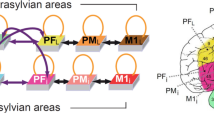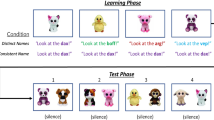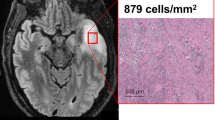Abstract
Studies aimed at characterizing the operation of cognitive functions in normal individuals have examined data from patients with focal cerebral insult. These studies assume that brain damage impairs functions of the cognitive processes along lines that honour the ‘normal’ pre-morbid organization of the cognitive system1. For example, detailed study of individual brain-damaged patients has revealed apparently selective disruption of cognitive functions such as auditory/verbal working memory2, phonological processing ability3, grapheme-to-phoneme translation procedures4and semantic processing5. Warrington et al. have studied patients with even more fine-grained selective disturbances of the semantic system6,7. The most selective deficits have been reported for four patients who were significantly better at identifying inanimate objects than they were at identifying living things and foods8. These patterns of selective deficit after localized brain damage provide important information about the normal organization of the lexicon, and ultimately about how components of the lexical system are related to particular neural substrates. Here, we report a case study of a patient demonstrating a very selective disturbance of the ability to name items from two related semantic categories. Despite normal performance on a large battery of lexical/semantic tasks, the patient shows a consistent and striking disability in naming members of the semantic categories of ‘fruits’ and ‘vegetables’. The selectivity of this deficit supports a category-specific organization of the mental lexicon, and suggests independence of the processing routes involving naming and name recognition.
This is a preview of subscription content, access via your institution
Access options
Subscribe to this journal
Receive 51 print issues and online access
$199.00 per year
only $3.90 per issue
Buy this article
- Purchase on Springer Link
- Instant access to full article PDF
Prices may be subject to local taxes which are calculated during checkout
Similar content being viewed by others
References
Saffran, E. M. Br. J. Psychol. 73, 317 (1982).
Warrington, E. K. & Shallice, T. Brain 92, 885 (1969).
Caramazza, A., Berndt, R. S. & Basili, A. Brain Language 18, 128 (1983).
Beauvois, M. F. & Derousne, J. J. Nerurol. Neurosurg. Psychiat. 42, 1115 (1979).
Schwartz, M. F., Marin, O. S. M. & Saffran, E. M. Brain Language 7, 277 (1979).
Warrington, E. Br. J. Psychol. 72, 175–196 (1981).
Warrington, E. & McCarthy, R. Brain 106, 859 (1983).
Warrington, E. & Shallice, T. Brain 107, 829 (1984).
Goodglass, H. & Kaplan, E. The Assessment of Aphasia and Related Disorders (Lea & Febiger, Philadelphia, 1972).
Francis, N. & Kucera, H. Frequency Analysis of English Usage (Houghton Mifflin, Boston, 1982).
Author information
Authors and Affiliations
Rights and permissions
About this article
Cite this article
Hart, J., Berndt, R. & Caramazza, A. Category-specific naming deficit following cerebral infarction. Nature 316, 439–440 (1985). https://doi.org/10.1038/316439a0
Received:
Accepted:
Issue Date:
DOI: https://doi.org/10.1038/316439a0
This article is cited by
-
Task-based activation and resting-state connectivity predict individual differences in semantic capacity for complex semantic knowledge
Communications Biology (2023)
-
Factors affecting the retrieval of famous names
Neurological Sciences (2010)
-
Change in pattern of ongoing cortical activity with auditory category learning
Nature (2001)
-
A neural basis for lexical retrieval
Nature (1996)
Comments
By submitting a comment you agree to abide by our Terms and Community Guidelines. If you find something abusive or that does not comply with our terms or guidelines please flag it as inappropriate.



